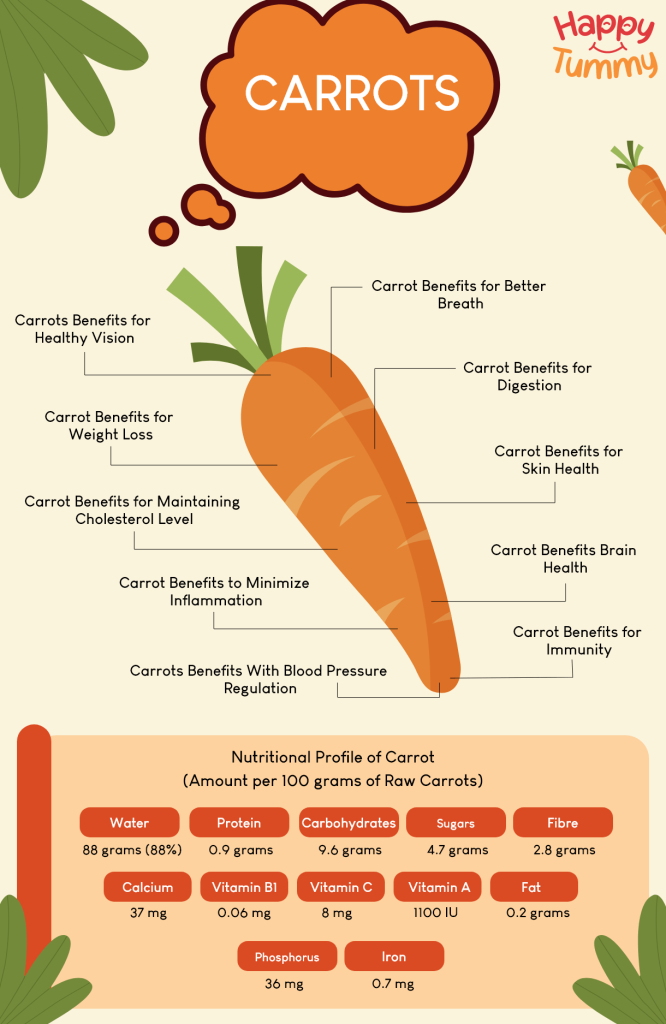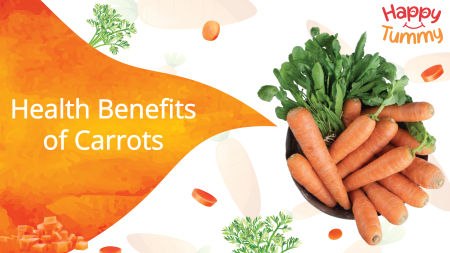Table of Contents
Carrots have long been associated with stardom. It has always been a favourite food of the bunny, the go-to puree for tiny babies, and the snack liked by teens with specs. For some or other reason, this orange coloured food remains in the picture.
However, in the complicated world of health and fitness, many no longer benefit from or find carrots as appealing as they once were due to the arrival of every new fad diet. While trendy eating plans come and go, this orange vegetable with countless health advantages remains.
It is now necessary to bring it back to ensure we eat its abundance of benefits and nutrients. Continue reading to find out why carrots are healthy for you.
About Carrots (Gajar)
Carrots are known to be healthy for your eyes, but you may not have known several other interesting facts about them. You might believe that you already know everything there is to know about the well-liked and healthful vegetable, but spoiler alert: chances are you don’t unless you’re an expert in facts about carrots.
We’re not just talking about their scientific name, Daucus carota. There is much to learn about carrots, including how they survive the winter underground, which sections are edible, and their numerous applications and advantages.
Carrots are biennial plants (a two-year process, with distinct growth phases occurring yearly) grown for their colourful, orange, purple, yellow, and white delicious roots. They belong to the Apiaceae family and are widely grown around the world.
They are a popular addition to soups, salads, stews, and stir-fries due to their sweet flavour and crisp texture. It is one of the most widely used and flexible crops in agriculture because they are relatively easy to cultivate and may be adapted to various soil types and climates.
Their long growing season (70-120 days, depending on the cultivar) and ability to thrive in cool conditions make them perfect for cultivating temperate climes in spring and fall.
Carrot Nutrition per 100 gms
Due to their abundance of several nutrients, carrots are vital for health. Carrots are a good source of iron, magnesium, potassium, and vitamins A, C, and B.
Also, they contain essential minerals like iron, fibre, carbohydrates, and water that help keep you fit and fabulous. The following nutrients are included in the serving size of 100 grams [1]:
| Nutrient | Amount per 100 grams of Raw Carrots |
| Water | 88 grams (88%) |
| Protein | 0.9 grams |
| Carbohydrates | 9.6 grams |
| Sugar | 4.7 grams |
| Fibre | 2.8 grams |
| Fat | 0.2 grams |
| Vitamin A | 1100 IU |
| Vitamin C | 8 mg |
| Vitamin B1 | 0.06 mg |
| Calcium | 37 mg |
| Phosphorus | 36 mg |
| Iron | 0.7 mg |
Crucial vitamins and minerals are abundant in carrots. To put things more clearly, a half-cup may provide you with
- 73% of your daily requirement of vitamin A
- 9% of your daily vitamin K
- 8% of your daily potassium and fibre
- 5% of your daily vitamin C
- 2% of your daily calcium, and iron
Health Benefits of Carrots

#1 Carrots Benefits for Healthy Vision
Carrots’ vivid red or orange colour indicates that they are high in beta-carotene, an antioxidant that your body uses to make vitamin A [2].
Vitamin A is essential for good eyesight maintenance and the prevention of night blindness, relieving you of the hassle of wearing glasses to view objects. It might also prevent age-related degradation.
Thus, consuming carrots as part of your diet may help you achieve healthy vision and eliminate gloomy eyesight.
#2 Carrot Benefits for Skin Health
Antioxidants in carrots, such as vitamin C and carotenoids, might assist your body and skin escape toxins from the outside world and fend off damage from free radicals, supporting healthy skin.
Carrots include a significant amount of vitamin C, which may help to produce collagen and maintain your skin’s youthful, supple appearance [3].
Carrots are an excellent snack for those who wish to improve their diet through skin products.
#3 Carrot Benefits for Immunity
Nutrients included in carrots, such as vitamins A, C, and B6, are vital for immunity.
Carrots include vitamin A, which forms and protects mucous membranes, bolstering the body’s defences.
These membranes function as barriers that prevent pathogens from entering our bodies through the digestive and respiratory systems [4].
In a similar vein, vitamin C from carrots is essential for boosting immunity and encouraging recovery. These vitamins might work together to keep our bodies healthy and infections-free by strengthening our natural defences.
Carrots are also a rich vitamin B6 source, ensuring your immune system is not left hanging. These vitamins might support a robust immune system and guard against infections, the flu, and other illnesses [5].
Additionally, vitamin B6 promotes the generation of antibodies, which might aid in your quick recovery from infections.
Thus, eating carrots may support maintaining a robust immune system!
#4 Carrot Benefits for Digestion
Fibre, abundant in carrots, is essential for preserving a healthy digestive tract. It might encourage regular bowel movements and healthy digestion, which keeps you energized and engaged throughout the day [6].
As per Ayurveda, carrots are considered as “Deepana” and “laghu”. It means that they are easy to digest and might help improve your digestive strength.
Good fibre quantity may also avoid bloating and constipation, keeping you fit and fine all day. You could occasionally experience confusion over your digestive quotient. With Aashirvaad Digestive Quotient, things do, however, become more manageable.
The Digestion Quotient test, created by Aashirvaad Atta with Multigrains and a team of professional nutritionists, determines your digestion score on a scale of 100.
Take this two-minute test to assess your Digestive Quotient, then use your scorecard to plan your meals properly and determine whether your road to a Happy Tummy is going well.
#5 Carrot Benefits for Weight Loss
Carrots’ low-calorie and low-fat content make them a significant weight loss or maintenance option [7]. It also contains a lot of water and fibre, which might increase feelings of fullness and content.
Their ability to satisfy hunger reduces the desire for needless eating. Carrots’ high nutritious profile might help people lose weight by preventing overeating between meals.
So, try to incorporate a few carrots in your diet rotation if you’re attempting to lose weight.
#6 Carrot Benefits for Maintaining Cholesterol Level
Carrots contain soluble fibre that may aid in binding the cholesterol in the digestive system and preventing it from entering the bloodstream. This may help to improve heart health by reducing harmful cholesterol levels [8].
Carrots may lower cholesterol and keep you full when you eat them in salads, mixed vegetables, or a cup of sliced carrots.
#7 Carrots Benefits With Blood Pressure Regulation
Carrots contain potassium, which is essential for controlling blood pressure. This mineral might help flush out excess fluid and sodium from the body, balancing sodium levels and relieving pressure on the heart [9].
This also makes carrots a good choice if you want to de-bloat after consuming too much salty food.
#8 Carrot Benefits Brain Health
Because they are an excellent source of vital nutrients that support brain health, carrots are good for your brain. Beta-carotene, one of the antioxidants found in carrots, might help shield your brain from the harm that aging and some diseases may bring.
Carrots are a great source of vitamin A, which may help maintain healthy eyes and a sharp memory as you age. Vitamin B6 is also included in carrots, which aids in producing neurotransmitters in the brain that communicate with other brain cells [10].
Chlorine, another mineral in carrots, is necessary for memory and general brain function. Consuming carrots regularly may help maintain your brain’s health and functionality as you age.
Beta-carotene is higher in cooked carrots than raw carrots.
#9 Carrot Benefits to Minimize Inflammation
Carrots also include fibre, luteolin, an antioxidant, and vitamins A, B, and C, all aiding the battle against inflammation. Fibre improves intestinal health, keeps you regular, and helps prevent chronic disease [11].
One medium-sized carrot will provide roughly 10% of the recommended daily fibre intake. Quite remarkable for a tiny orange vegetable!
You may occasionally find it challenging to keep track of nutritious meals and are constantly searching for methods to consume more fibre.
So, people need not worry—The My Meal Plan test, developed by Aashirvaad Atta with Multigrains and a group of skilled nutritionists, may ascertain your daily fibre consumption and offer you a thorough meal plan that conforms to the suggested intake.
To begin utilizing it, simply click the link.
#10 Carrot Benefits for Breath, Odour, and Sweat Relief
Carrots may increase saliva production because of its inherent fibrous and crunchy texture. Saliva lowers the incidence of cavities and gum disease by cleaning the mouth of food particles and bacteria.
Carrot chewing is beneficial for your teeth and gums and increases your intake of Vitamin A, which is necessary to maintain strong teeth. Vitamin A promotes the synthesis of keratin, a protein that aids in the fight against plaque accumulation and helps shield the enamel, the outer covering of your teeth [12].
Consistent consumption of carrots within safe daily doses may help relieve odour and excess sweating by balancing “pitta” or fire element in the body.
Carrot Benefits for Men and Women
| Carrot Benefits for Men | Carrot Benefits for Women |
| Rich in beta-carotene, which may reduce the risk of prostate cancer. | Supports healthy menstrual function and reproductive health. |
| Contains antioxidants that support overall immune function. | Supports immune function and may reduce the risk of chronic diseases. |
| Good source of dietary fiber, which supports digestive health. | Helps maintain digestive health. |
| May contribute to heart health by lowering blood pressure and cholesterol levels. | Helps maintain heart health by managing cholesterol levels. |
| Supports bone health and may reduce the risk of osteoporosis. | Helps promote healthy skin and prevents signs of aging. |
How to Get More Carrots into Your Diet?
Given their well-known anti-inflammatory, antioxidant, and disease-prevention properties, you’re undoubtedly eager to reap the many health advantages of these root veggies. They also give your plate a pop of colour.
Here are a few suggestions for increasing the number of carrots (and colour) in your diet:
#1 Carrot Pickle
Carrot pickle is a side dish with all the necessary flavours—sweet, sour, spicy, and crunchy—to enhance the overall taste of a meal. Gajar ka Achar’s khatta meetha flavour is quite delicious.
The icing on the cake is that you may prepare and savour this quick pickle. First, heat some oil and add freshly sliced carrots, preferably along with some red chili powder, mustard seeds, fenugreek seeds, ginger, turmeric, and garlic.
For some zing, add vinegar or lemon juice. Thoroughly stir everything together and taste it. Keep enclosed in a sealed container.
#2 Gajar Ka Halwa
Winter is incomplete without indulging in a steaming bowl of freshly prepared Gajar Ka Halwa to quench your sweet taste. Everyone enjoys Gajar Halwa, regardless of age.
You’ll be happy to hear that there’s a simple recipe for making this delicious treat that’s also healthier.
Grate the carrots and boil them with milk, sugar, and cardamom over low heat until the milk evaporates to make Gajar ka Halwa (Carrot Halwa). Cook the mixture until it thickens by adding the ghee. Add nuts, such as pistachios and almonds, as garnish.
All you have to do to boost the nutritional value of this well-liked winter dessert is swap out refined sugar with iron-rich dates, leaving the other ingredients unchanged. Add a ton of dry fruits and nuts as well.
Your guests will be amazed by this delicious delicacy. However, enjoy it in moderation and avoid going overboard.
# 3 Gajar-Matar Sabzi
Every household has this well-liked dry vegetable as a mainstay. Colourful and flavourful, this lovely vegetable combination is cooked with aromatic spices, including cumin, coriander, and garam masala.
Because gajar matar is full of proteins and vitamins and low in calories, it’s the ideal carrot meal to prepare in winter.
The peas give a delightful crunch, and the carrots offer a natural sweetness. Enjoy a lovely main meal with hot, fluffy chapatis, raita, and dal.
#4 Carrot Soup
Carrot soup is rich, flavourful, and creamy—a wintertime favourite for people of all ages. It is low in effort, simple to prepare, and healthful. It tastes somewhat sweet, is filling, and is light.
To create a hearty carrot soup, roast the carrots in the best cooking oils, olive or canola oil, with onion and other ground spices. You may also add ginger and garlic.
Stir and thoroughly mix in the water until the carrots become tender.
Give it time to simmer. Taste and add some lemon juice.
Carrot-Related Risks
Extreme beta carotene overload from carrots may impair vitamin A function and impact your immune system, metabolism, bones, skin, eyesight, and skin [13].
For those who are unable to convert beta carotene into vitamin A, such as those with hypothyroidism, an excess of it may also be problematic.
Overconsumption of beta carotene may result in orange-yellow skin. This condition is called carotenemia. It’s relatively harmless and unlikely to cause any severe problems [14]. Lowering your intake of foods high in carotene, such as carrots, is one way to treat it. To address it, you may discuss modifying your diet with a dietician.
As carrots’ seeds are abortifacient ( substances used to terminate pregnancy), pregnant ladies should eat with caution. It is preferable to consult dieticians or doctors to avoid any issues.
ITC thinks that maintaining a healthy lifestyle requires consuming a balanced diet. Call our certified nutritionist for a 45-minute consultation to receive a customized nutrition plan created specifically for you.
All you need to do is schedule an appointment with the dieticians and nutritionists. After that, you may have a virtual meeting with the dietician to discuss any questions you have about any health issue.
A Quick Review
Though eating a load of carrots daily won’t stop aging skin and eyesight loss, they may undoubtedly do a lot of good work. No meal is a miraculous cure. Eat to the hue of the rainbow.
However, carrots provide a plethora of health benefits, including the potential to support healthy vision, aid in weight management, regulate blood pressure, lessen the risk of heart disease, enhance immunity, and support brain function. You won’t be sorry to eat more of this veggie in general.
Try including some carrots into your regular diet to get a quick and tasty boost of nutrients.
Frequently Asked Questions
A. You may refrigerate the fresh carrot for up to two weeks. First, cut off any remaining leafy green tops. After that, put them in a plastic bag with holes in it for storage.
A. Carrots have nutritional advantages when eaten raw or cooked. Carrots that have been cooked increase the body’s ability to absorb beta-carotene, even though raw carrots retain more vitamin C. You may optimize the nutritional content of carrots by consuming a range of cooked and raw varieties.
A. Because carrots contain a lot of beta-carotene, they may benefit eye health. The body transforms beta-carotene into vitamin A, essential for preserving good vision, particularly in dimly lit environments.
A. One of the first solid foods that babies are frequently exposed to is carrots. Carrots cooked and mashed make a wholesome and simple-to-digest solid food for babies. However, before adding any new item to a baby’s diet, speaking with a pediatrician is imperative.
A. Carrots are a healthy, balanced food you may eat regularly. Carotenemia, which causes your skin to appear orange-yellow, is rare unless you consume excessive amounts of carrots and other foods high in carotene.
A. Indeed. As you chew, the enamel of your teeth may be cleaned by carrots, which also helps remove harmful plaque accumulation. In addition, they eliminate surface stains, resulting in a more radiant smile.















